Pregnancy brings about a multitude of changes in a woman’s life both physically and mentally. It can be challenging for moms to embrace these changes wholeheartedly. However, with time things tend to normalize. During this phase, new mothers must pay attention to their skincare regimen while also caring for their baby.
When it comes to postpartum skincare the safety of products is of importance due to risks to the child’s health. It’s essential to know which ingredients are safe and which ones should be avoided. Let’s explore the skin issues faced during the postpartum period and discover ingredients that can be used.
Skin Changes During the Postpartum Period
One prevalent skin issue after giving birth is loose and saggy skin caused by nine months of stretching during pregnancy. Over time the skin will gradually regain its texture. Engaging in exercises can be beneficial, for addressing this concern as they improve circulation and strengthen muscles. However, it is advisable to wait six weeks before starting any exercise routine or consult your doctor for guidance.
Postpartum often brings issues like melasma and skin scratches. While melasma naturally fades after delivery using skincare products, natural ingredients like Azelaic acid can help speed up its recovery. On the other hand, skin scratches may fade over time. Won’t completely disappear. However, there are some treatments and products such as shea butter, coconut oil, and vitamin E that can be used to moisturize the affected area and reduce itching and dryness.
Another common concern in postpartum is oily skin. Hormonal changes during this period can lead to a gland resulting in excessive sebum production. This excess sebum makes the skin oilier and more susceptible to acne breakouts. Adopting a lifestyle using creams following a balanced diet and staying well hydrated can all contribute to effective acne treatment.
Dealing with skin is also a challenge for postpartum individuals. Gentle cleansing with high-quality moisturizers proves beneficial, in managing sebum production that causes skin.
Skincare Ingredients to Avoid during the Postpartum Period
Most skincare products are generally safe. Do not have any adverse effects, on the skin. However, when breastfeeding it’s important to be mindful of using topical products that won’t be absorbed into your skin. Prior to feeding your baby make sure to wipe off any products or creams from your breasts and skin.
During the postpartum phase, there are products that should be avoided. One example is steroid creams and topical corticosteroids.

Topical corticosteroids, such as steroid creams are prescribed medications for skin issues. However, caution must be exercised when using them during the postpartum period due to impacts on both the mother and the breastfeeding baby.
Doctors often prescribe steroid creams to address conditions, like eczema, psoriasis, and contact dermatitis. These creams are directly applied to affected areas of the skin to reduce inflammation, redness, and itching.
While breastfeeding it’s important to approach steroid usage with care. Although they are generally considered safe in amounts that are absorbed into the body it is recommended to consult a healthcare before using them extensively. This is because prolonged use can potentially lead to thinning of the skin and increased fragility.
In addition, using steroid creams on your face can potentially lead to the development of dermatitis, a rash. It’s crucial to have supervision and follow the guidance of a healthcare professional when applying these creams during the postpartum period. Always strive to use the strength that effectively addresses your skin condition.
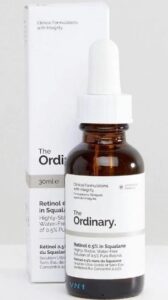
Another ingredient to consider is retinol. Derived from vitamin A retinol products are well known for their ability to minimize wrinkles and acne while reducing spots. It works wonders for aging skin. Boosts collagen production. However, it’s important to avoid using retinol during pregnancy and nursing as it may cause redness, dryness, and skin irritation if it comes into contact, with your baby’s skin.
One ingredient is hydroquinone, which is renowned for its bleaching properties. This ingredient is beneficial in lightening spots and treating conditions, like melasma.
It is generally advised to avoid using hydroquinone during pregnancy and after giving birth due, to risks. This is because hydroquinone can be absorbed into the mother’s bloodstream, which may have effects on the baby’s health.
Another chemical called oxybenzone is used in sun serums to absorb light. However, it is also one of the restricted ingredients that should not be applied during the postpartum period.
The mother’s skin can absorb oxybenzone. There is a possibility of it entering breast milk. Using sunscreen or serum with oxybenzone can lead to rashes, hives, and irritation. While research has not extensively explored how it specifically affects babies it is advisable to avoid its use while breastfeeding due to its absorption into breast milk.
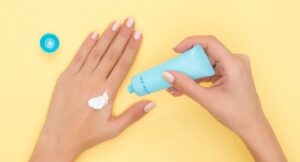
Regarding pregnancy-related skin changes like melasma, acne, and darker patches they generally start fading within a month after childbirth. These changes occur as a result of shifts that take place after giving birth. Adopting a lifestyle along, with protecting your skin from the sun and maintaining a skincare routine can help speed up the process of resolving any pregnancy skin issues you may have had.
However, it’s important to keep in mind that everyone’s experiences may be different. It’s always advisable to consult with a dermatologist, for advice.
Safe Postpartum Skin Treatments
When it comes to postpartum skincare there are options. Natural ingredients like vitamin E, almond oil, coconut oil, and aloe vera oil are generally considered safe for all individuals, including pregnant and breastfeeding women. However, if you notice any changes in your skin it’s always best to consult your doctor.
Lactic Acid;
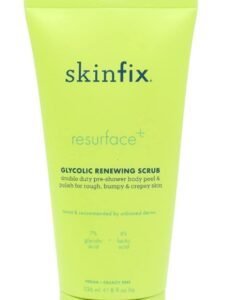
Lactic acid is derived from milk and is used in skincare products to promote cell turnover and gently exfoliate the skin. As an alpha acid (AHA) it helps remove skin cells and unclog pores. It is considered an ingredient for breastfeeding mothers who want to achieve soft radiant skin. Using acid can be highly beneficial.
Chemical Peels;
Chemical peels involve applying a chemical solution to the skin to exfoliate and remove layers of the skin. These treatments are focused on improving the appearance of neck or hand skin. They can effectively address skin concerns such, as lines, wrinkles, uneven skin tone, acne scars and sun damage.
According to a doctor it is generally considered safe to undergo medium-depth chemical peels while breastfeeding.
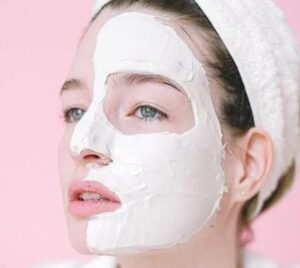
Chemical Peels can help diminish the appearance of lines and wrinkles, eliminate sunspots, age spots, and melasma, and Chemical peels assist in clearing acne breakouts and fading acne scars.
It’s important to note that not all types of chemical peels are suitable for every skin type. Seeking advice from a dermatologist is crucial in determining the peel type and strength for your needs.
Niacinamide;
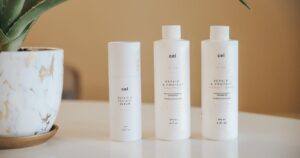
Niacinamide offers benefits for the skin for those, with sensitive skin. It is a water form of vitamin B3 that can help out skin tone and brighten the complexion.
IPL Treatment
IPL laser technology, also known as Pulsed Light is commonly used in dermatology and cosmetics to address skin concerns. While it is not specifically designed for postpartum use it offers benefits during this phase.
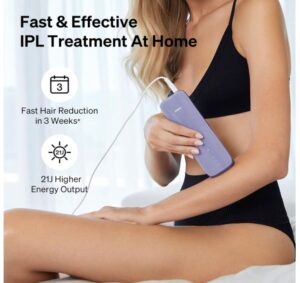
Here are a few ways IPL can be beneficial, during the postpartum period;
- Skin Rejuvenation; IPL promotes collagen production leading to skin texture and a rejuvenated appearance.
- Rosacea Treatment; IPL effectively reduces redness and visible blood vessels associated with rosacea, which can become more noticeable or worsen during pregnancy and postpartum.
- General Skin Enhancement; IPL treatments help enhance skin tone minimize lines and improve skin appearance.
- Acne Treatment; Hormonal changes after childbirth can sometimes result in postpartum acne. However, IPL can target acne lesions. Reduce redness.
- Unwanted hair removal; hormonal changes may cause unwanted hair growth. IPL hair removal devices can apply gentle pulses of light to the hair roots, putting hair into a resting phase: Your hair falls out and gradually, your body grows less hair in that area.
It’s important to consider the following factors when considering IPL treatments;
- Consultation with a healthcare professional or dermatologist is recommended before undergoing any procedures.
- Ensure that the treatment is safe, for breastfeeding mothers and pregnant women by discussing it with your healthcare provider.
The timing of IPL treatments may be influenced by factors like breastfeeding. It is crucial to discuss with your healthcare provider and the practitioner to avoid any skin problems.
After receiving IPL treatments it is vital to be diligent about protecting yourself from the sun to prevent hyperpigmentation. This becomes especially significant during the postpartum period when hormonal changes can make the skin more susceptible to pigmentation issues.
To Sum Up
When considering any procedure during the postpartum period it’s essential to prioritize both the mother’s and baby’s health and well-being. Always seek guidance from healthcare professionals and qualified practitioners to ensure that any skincare treatments are safe and suitable, for your circumstances.

 By myulikeadmin
By myulikeadmin



